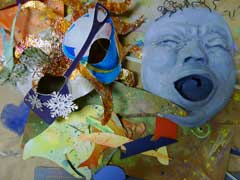
The Bullying Thing
When I was growing up, some people were mean to me and I was mean to some people. It hurt, and sure, I went home from school crying some days, and sometimes, other people went home crying because of something I did or said. But that was just kid-life. Since when did bullying become a THING, a THING that was newsworthy, law-worthy (really, we can outlaw bullying?), and, most troublingly, leads to so many young people’s deaths? What is going on that kid-on-kid misbehavior now is a not uncommon cause of self-inflicted death?
Ron, Texas
Dr. Maggie: I am going to begin with something that might sound incendiary: bullying has become a pathogen (as opposed to an ordinary hazard of growing up as social creatures) because we adults have allowed it to metastasize. It has become, as Ron says, a THING, since we, as teachers, parents, neighbors, friends, caretakers, and pundits, have become lazy—with both ourselves and our children. It’s like Lord of The Flies out there and all we are doing is making silly rules and tearjerker PSAs.
Dr. Martha: That is quite a strong judgment. What do you mean, “lazy”?
Dr. Maggie: It is a strong judgment. I mean that instead of being disciplined about investigating the real causes of social cruelty in each instance—psychological causes–instead of taking the time to teach our kids (and ourselves) to self-examine why they do what they do, and react the way they react, we, the adults, cower behind militant and empty “zero tolerance” policies. Which results a) in no growth, and b) in punitive measures when what are needed are educational and psychological measures.
Bernie: I agree that the punitive approach is superficial and ineffective. The antidote to bullying (and to being the victim of bullying—which, I want to add, needs to be examined in equal measure with bullying), is not a slap on the wrist—it is self-examination. Know thyself.
Dr. Martha: Exactly. The reasons one kid bullies, or why one becomes a perpetual victim, are not only the avenues to prevent and heal such things but also can be quite interesting. For example, it is often the case that bullies act out because of an underlying fear or weakness, and that, contrary to popular opinion, many so-called victims are actually using their victim-hood as a kind of manipulative social currency, an underhanded kind of power.
Dr. Maggie: I agree with all of that, but the question was not what is the remedy for bullying. The question was since when, and why, has bullying become a legitimate enough social category that we need PSAs to encourage kids not to commit suicide because they are being bullied. Why are there nightly news specials dedicated to sociological study of “The Bully”—as though that’s a new breed of child?
Dr. Martha: Well, here’s where I disagree a little bit with Ron and with the trajectory of the question: Bullying has rarely been adequately addressed and it is no worse today than it was when we were kids, I don’t believe. So, we should be asking, what has changed? What has changed in terms of values, of vocabulary, of time adults spend with kids equipping them to commit, to learn about themselves, to tune into both their own and other people’s feelings?
Dr. Maggie: I agree that there has been a change in vocabulary and in values, but I think that change is a result of our gradually letting go of the reins, gradually letting the space of the “playground”– which used to be supervised and monitored by adults who were there to coach children in how to attend to their own and other people’s feelings – be co-opted by this strange new space of social media, something most of us over 30 play with, but, unlike the new generation, don’t live in, don’t fully understand. And I think, on the whole, we do a crap job of monitoring, policing and educating our kids about how to use that space to empower themselves, and to learn more deeply about both themselves and others. As for a change in vocabulary, I think it is lazy and sensationalist that we have made identity categories out of “Bully” and “Victim.” As if those describe a type of person, a cage one can’t escape from. I believe they are symptoms of underlying fear, weakness, trouble, pain—and those things are not “identities” or permanent labels; rather, they are just our psyche’s way of telling us we need to get to work and figure ourselves out a bit.
Dr. Martha: Why do you keep falling back on “lazy”? Just accusing adults of being lazy or sensationalist is default, knee jerk— How do we solve “lazy”? What’s under “lazy”?
Dr. Maggie: By doing what you just did. I began with a somewhat nasty, hasty, and I would venture, “lazy” judgment and you called me to task on it, inviting me to examine myself. So, why did I blanketly accuse ”adults” of failing, of being “lazy”?
Bernie: Yes, in other words, why were you bullying them? I think most parents, teachers, guardians and lawmakers would be very hurt. I suspect most of us believe we are working very hard to do the best we can by the next generation.
Dr. Maggie: Yes. Here’s why I said what I said: In the face of all these tragic suicides, kids from all over who post on Facebook and YouTube and on their blogs about how sad and alone they feel, I—as an adult—I feel helpless.
So, we suspect, does Ron. So, we also suspect, do many parents, teachers, educators, guardians, etc. But identifying the underlying weakness that caused me to lash out—and probably causes others to create ineffective or counter-productive anti-bullying policies and analyses – isn’t where we stop. We must now ask: Am I? Am I actually helpless? No. I am not. Neither are they. Neither are the bullies or the victims. Neither are you. That was an unexamined reaction on my part. And because it went unexamined, not only did I rudely lash out, I also blinded myself to the real action I could actually take that would, ironically, mitigate the underlying feeling of helplessness that caused me to lash out to begin with. And that, right there, is what we can do. And knowing what we can do, and being taught and guided how to do it—which releases us from the barbs of our unexamined needs and fears—enables us to attend to the needs, the emotions, the fears and weaknesses of others with compassion—not just with labels or punitive measures. When we are educated, and prompted and encouraged to examine ourselves with compassion, we don’t need to “suck up” to the powerful kid (or employer or friend), to divide and conquer, to hurt others to disguise our own weaknesses or pains. Rather, we can be empowered by the responsibility, the gift, of being ourselves, seeing ourselves, and giving others the space in which to be and see the same.






